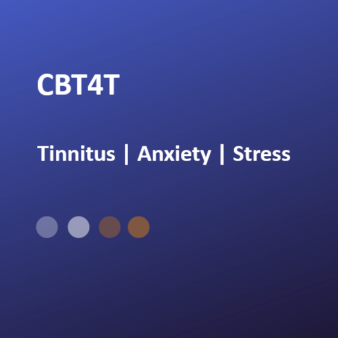About CBT4T & How to Enrol
Developed by Debbie Featherstone in 2020 and now in its fifth edition, the Neuroscience and Cognitive Behaviour Therapy (CBT) process used in CBT4T Online is specifically for people whose Tinnitus Functional Index (TFI) is high scoring - Category 4 (53-72%) and Category 5 (73-100%), although it is equally successful for those enrolling with a TFI Category 3 (32-53%).
A category 4 and 5 TFI reflects higher than normal stress/anxiety symptoms, a significant proportion of which is shock-reaction that cannot be processed by cognitive processing through CBT. Rather, shock remains stored in the body, wreaking havoc through unexplained symptoms, both physical and emotional.
Reduce stress and reduce anxiety using the process in CBT4T that first accesses, then clears the stored shock, enabling consistent excellent outcomes from the bespoke CBT process in this specialist programme.
The CBT4T process has evolved in to what compares closely with innovative, recent approaches in two other clinical fields: Pain Management (Pain Reprocessing Therapy - PRT) and Trauma (Cognitive Processing Therapy - CPT).
CBT4T Overview & Enrolment
The online CBT4T Programme is provided by dual qualified Hearing Therapist & Psychotherapist Debbie Featherstone. Add appointments either when you enrol or later. The first appointment is due after completing Stage 4.
The new 2026 CBT4T edition available from 27th November 2025
- Enrol with TWO APPOINTMENTS included: CBT4T ONLINE - £285 (or 3 x £100) The most popular enrolment, this enrolment includes TWO appointments, the first of which takes place on completion of Stage 4
- Enrol with ONE APPOINTMENT included: CBT4T ONLINE - £190 (or 3 monthly payments of £65) 80% of enrolments in 2025 used only one appointment (average 1 hour 20 minutes). A first appointment is due on completing Stage 4
- Enrol with THREE APPOINTMENTS included: CBT4T ONLINE - £380 (or 3 x £130) An option when your initial Tinnitus Functional Index (TFI) is category 5. A first appointment is due on completing Stage 4
- For an enhanced level of support enrol in the new enhanced-support course if you prefer monthly appointments during your first 6 months in the course: £665 or 6 month payment plan for £115 pcm.
Complete a Tinnitus Functional Index (TFI) and make sure to request your results at the end of the questions before you press Send. You will receive an email with your TFI results and supporting information about CBT4T.
A CBT for Tinnitus E-Programme (CBT4T) Case Study
About the Neuroscience, Brain Plasticity and Cognitive Behaviour Therapy (CBT)
There are around 86 billion neurons in the brain, organised to fire in patterns (neural pathways) that produce what we experience, moment by moment. Their purpose is to process information and it's the processed information that gives us what we experience.
Neurons that fire together, wire together through repetition, resulting in processed information repeating over and over. This all works to our benefit until what we experience is unpleasant.
Firing patterns of neurons (neural pathways) don't differentiate between an actual experience and an imagined experience, so when we imagine a pleasant experience, the patterns produced are the same as if we were having the actual pleasant experience.
The downside is that firing patterns (neural pathways) work in the same way when we have - or imagine - an unpleasant experience. Something called "Cognitive Bias" kicks in - for good reason, as our brains are wired first and foremost for survival. What we know we know – we cannot “un-know” it. Whatever is going on around us we view through our own window of Cognitive Bias. Consciously and unconsciously, we persistently seek out that which confirms what we know (Confirmation Bias), ignoring to the point of not even noticing there may be alternatives. This is how we end up going down the rabbit hole of suffering, and we perpetuate suffering through multiple means, one of the most common being the repeated use of Cognitive Distortions, for example:
- Predicting the future
- All or nothing thinking
- Maximising the negative, minimising the positive
- Emotional reasoning
- Self and other blaming
Fortunately, brain plasticity gives us the ability to change old firing patterns in to NEW firing patterns of neurons. The more FLEXIBLE we allow our mind (mindset) to be, the more EFFECTIVELY we make use of brain plasticity, precisely what CBT4T enables you to do.
